German Chancellor Angela Merkel’s conservative party has pulled off a third state election win in a row. It’s a political hat-trick that only a few months ago seemed unthinkable, writes Constanze Stelzenmüller, adding that for now, Angela Merkel’s triple victory is a confidence-booster for her. This piece originally appeared in the Washington Post.
With the third state election win in a row for her conservative party, German Chancellor Angela Merkel has pulled off a political hat-trick that only a few months ago seemed unthinkable. It may even provide her with enough momentum to coast into a fourth term in the federal elections on September 24. For center-left challenger Martin Schulz, it is a nasty blow in his home state that may signal the demise of his candidacy before his campaign has really begun.
The weekend vote in Germany’s most populous state, North Rhine-Westphalia (at nearly 18 million, it is home to more than one-fifth of the country’s inhabitants), was the last and most important state election before the national poll in the fall. Voters agreed: Turnout was well above average at 65 percent.
The result, which builds on earlier victories in the states Schleswig-Holstein and Saar, is yet another setback for Schulz’s Social Democrats (SPD). They badly needed to stop Merkel’s upswing and hold on to power in their traditional western heartland, where the SPD has governed for all but five years since 1966. But in recent weeks, the party’s 10-percent lead over the Christian Democratic Union dissolved into a neck-and-neck race. On Sunday, it dropped nearly eight percent to 31.2 percent—the worst showing in the state since 1947. The SPD’s coalition partner, the Green Party, lost nearly half its support, falling to 6.4 percent.
Meanwhile, Merkel’s center-right CDU won 33 percent of the vote, up nearly seven percent from the last election in 2012. The liberal Free Democrats (FDP) made a strong showing at 12.6 percent. The right-wing Alternative for Germany (AfD) gained 7.4 percent and is now represented in 13 out of 16 state legislatures. The post-communist Left party failed to cross the 5 percent entry threshold for the second time in a row.
Some of the voters’ motives were local, as post-election opinion polls showed: Unhappiness with the government’s poor performance on issues such as crime, traffic, schools and jobs in a post-coal-and-steel economy dragged down approval for the once-popular chief minister Hannelore Kraft. Her unpersuasive challenger, Armin Laschet, conversely benefited from his chancellor’s seemingly unassailable stature as the leader of Europe.
The brief flowering of support that the centrist and pro-European Schulz enjoyed in March and April showed that Germans, after nearly 12 years of Merkel, would quite like a choice of leader, if not an actual change of course. But the combined effect of Brexit, President Trump and two perilously close defeats of populists in the Netherlands and France have clearly caused voters to rediscover the attractions of the centrist they know.
Germans also appreciate how the chancellor has handled herself in several recent tight spots, domestic and international. Indeed, Merkel has a finely-honed ability to combine calm—even charm—with toughness and to stubbornly assert a principle while finessing it in practice.
In late 2015, Merkel made the honorable choice of admitting nearly a million Syrian refugees, but appeared overwhelmed by the fear and anger it unleashed. Shrewdly, she defended her decision, but shuttered Germany’s borders and cut off the flow by making a deal with Ankara to keep refugees in Turkey. Enemies in her own party accused her of causing the rise of the right-wing AfD—in feverish anticipation that this might herald the end of her reign. But she made only minimal concessions to their critiques, like promising to outlaw the public wearing of burkas. Today, the AfD is polling in single digits again. And her detractors are glumly silent once more.
Many Germans find it reassuring that their chancellor is undaunted by strongmen such as Turkey’s Recep Tayyip Erdogan and Russia’s Vladimir Putin, and unfazed by difficult partners such as Israel’s Benjamin Netanyahu and America’s Trump. They also rather enjoy seeing her smile and raise a quizzical eyebrow at a U.S. president who just can’t bring himself to shake her hand.
The CDU’s two most recent state election victories now offer the option of experimenting with alternatives to the center-right-and-left “grand“ coalitions that have shaped eight of Merkel’s 12 years at the helm of the national government. There could be a “Jamaica“ (black-green-yellow) grouping of CDU, Greens and Liberals in Schleswig-Holstein, and a conservative-liberal coalition in North Rhine-Westphalia. But the smaller parties have a tendency to tie themselves in knots, while the Social Democrats like only one thing less than governing with Merkel’s party: being in opposition. No prizes for guessing the outcome.
For now Angela Merkel’s triple victory is a confidence-booster for her (we’re not counting Germany’s richly deserved second-to-last place in Sunday’s Eurovision contest). It will steady her hand in several important negotiations this summer: with France’s new president, Emmanuel Macron, on jump-starting the European Union; with British Prime Minister Theresa May to prevent Brexit from descending into toxic squabbles; and with Washington on Germany’s surpluses and defense spending ahead of G-20 and NATO summits.
With her party polling at 37 percent—10 points ahead of the Social Democrats—Merkel’s chances for the September elections look good. But if the past holds any lesson, it is that German politics remain fragmented and volatile. So caution is advised. But then that is one of the chancellor’s most notable qualities.
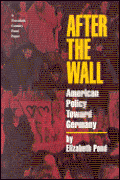
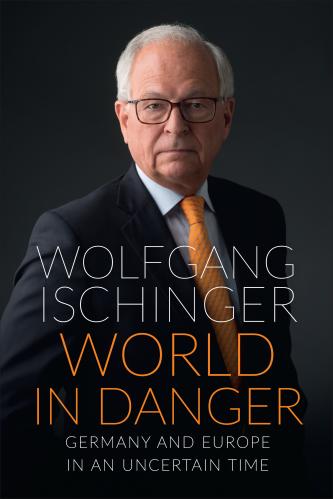
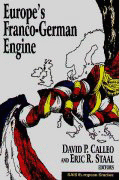
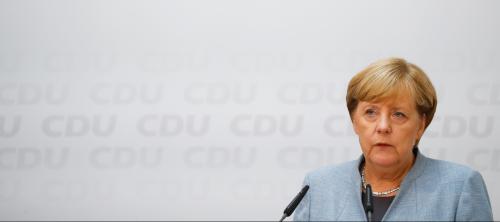
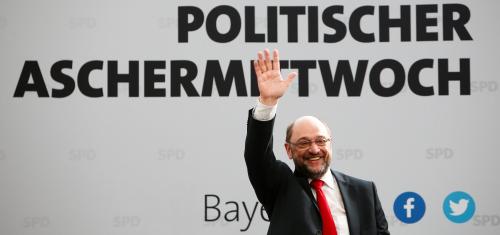
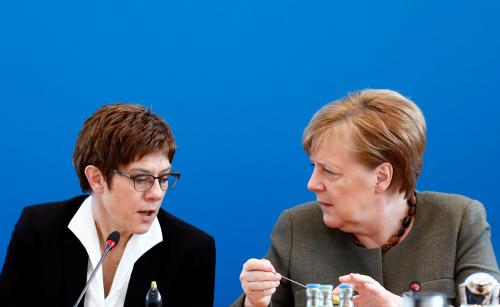

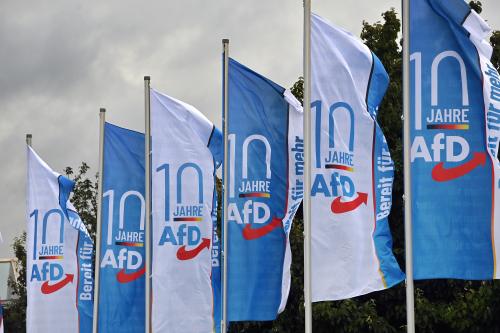
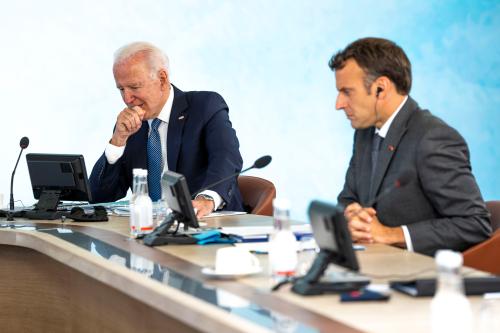
Commentary
In Germany, more momentum for Merkel
May 19, 2017